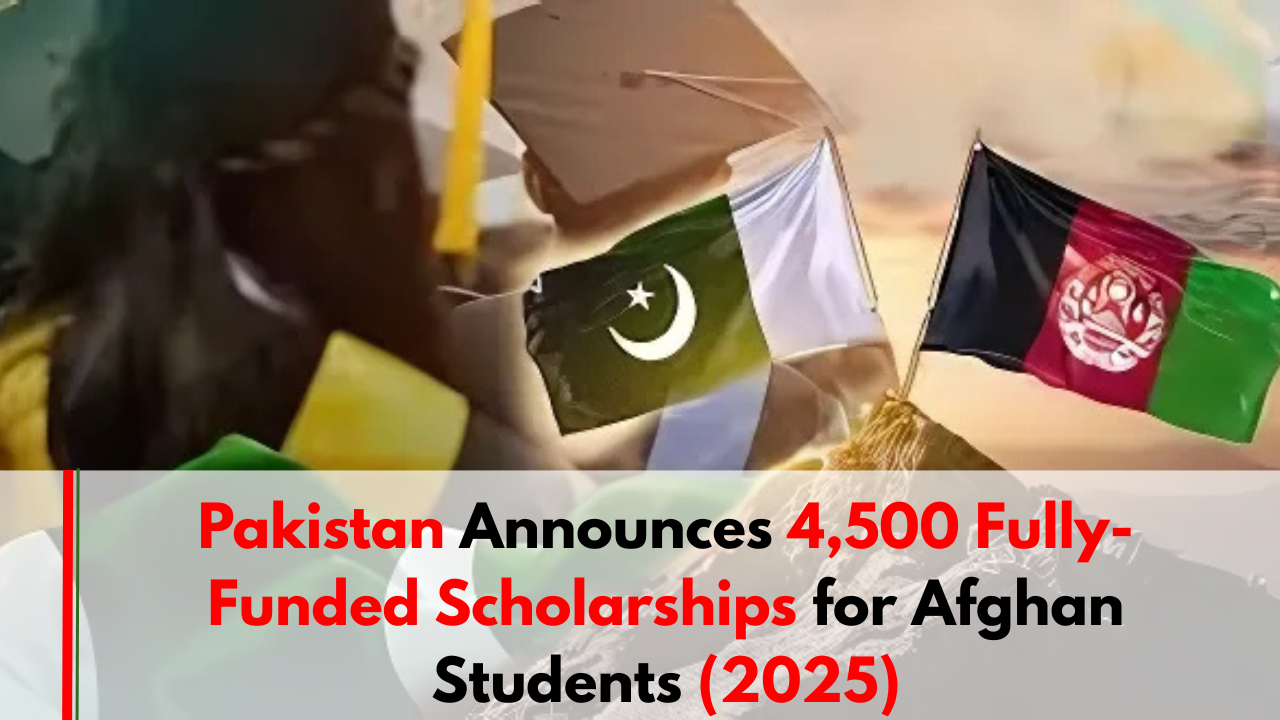4500 Fully-Funded Scholarships for Afghan Students
In a major initiative to strengthen educational and cultural ties with neighbouring Afghanistan, Pakistan has launched 4,500 fully-funded scholarships for Afghan students. This program is part of the Allama Muhammad Iqbal Scholarships Programme (Phase-III), overseen by Pakistan’s Higher Education Commission (HEC).
What the Scholarship Covers
The 4,500 scholarships are fully funded, meaning successful applicants will receive a complete package that includes:
- Tuition fees at Pakistani universities
- Hostel dues and accommodation
- Living allowance / stipend
- Book allowance
Thus, the financial burden on the student is minimal or none.
Who Can Apply & Levels of Study
These scholarships are open to Afghan nationals to pursue higher education in Pakistan at several levels:
- Undergraduate
- Graduate (Master’s / M.Phil)
- Doctoral (PhD)
Fields covered include, but are not limited to: medicine, engineering, agriculture, management, computer sciences, and other disciplines relevant to Afghanistan’s reconstruction and human development.
Reservation and Gender Quota
A notable feature of the scheme is that 33% of the seats are reserved for female students. This demonstrates Pakistan’s intention to ensure more inclusive participation, especially given the educational barriers faced by Afghan women.
Application & Selection Process
- Over 22,000 applications were reported from Afghan students for these 4,500 slots.
- Applicants will first take an online test, followed by interviews.
- The entire selection process is planned to conclude within 45 days once the test and interviews begin.
Timeline & Phases
- This is part of Phase-III of the Allama Muhammad Iqbal Scholarships.
- The 4,500 scholarships are to be awarded over a span of three years.
- The announcement of this phase came in early 2025.
Purpose & Objectives
The scheme has several key objectives:
- Capacity building of Afghan youth through quality education.
- Promoting professional linkages between institutions in Afghanistan and Pakistan.
- Contributing to human resource development for Afghanistan’s reconstruction and growth.
- Enhancing people-to-people contacts and goodwill between the two nations.
Recent Steps & Implementation
- Hundreds of Afghan students have already arrived for studies under the scheme, including both Master’s and PhD students.
- Preparatory courses are being provided in certain cases before formal admission to degree programs.
Challenges / Key Considerations
While the program is ambitious and generous, there are certain challenges and practical issues to keep in mind:
- Ensuring that the scholarship process remains fair and transparent, particularly with such a large number of applicants.
- Logistical considerations: travel, visa formalities, arrival, accommodation, and preparatory arrangements.
- Navigating language, curriculum, and cultural differences for students coming from Afghanistan.
- Ensuring that female candidates are able to participate fully, which may require additional support.
Impact and Significance
This initiative is seen as more than just a scholarship scheme. It represents:
- A gesture of educational diplomacy and soft power.
- Practical support for Afghanistan’s development through building educated human capital.
- Reinforcement of regional cooperation and shared responsibility.
- Opportunities for Afghan students that might otherwise be limited.
Key Facts at a Glance
| Item | Detail |
|---|---|
| Total Scholarships | 4,500 (over three years) |
| Eligible Nationals | Afghan students |
| Levels Covered | Undergraduate, Master’s/M.Phil, PhD |
| Disciplines | Medicine, Engineering, Agriculture, Computer Science, Management, etc. |
| Female Quota | 33% reserved seats for women |
| Process | Online test + interviews |
| Number of Applicants | ~22,000+ |
| Duration for Selection | ~45 days after tests & interviews begin |
Conclusion
Pakistan’s announcement of 4,500 fully funded scholarships for Afghan students in 2025 reflects a strong commitment to educational cooperation and building human capital across borders. For Afghan students, this offers a meaningful opportunity to access higher education, gain new skills, and contribute to their country’s long-term future. With a gender quota and inclusion of multiple levels of study, the program is designed to be broad and impactful.
